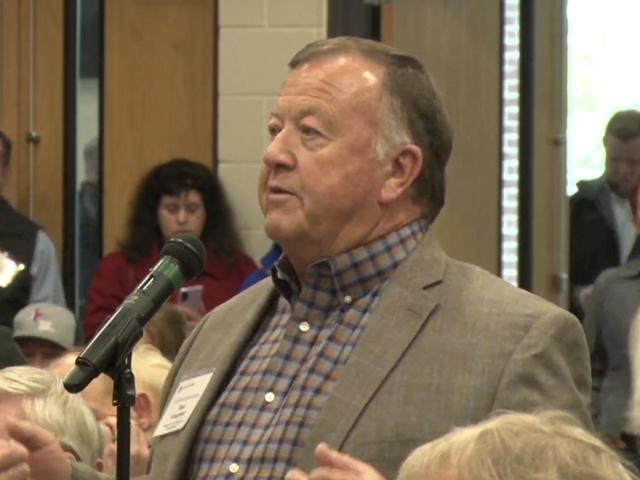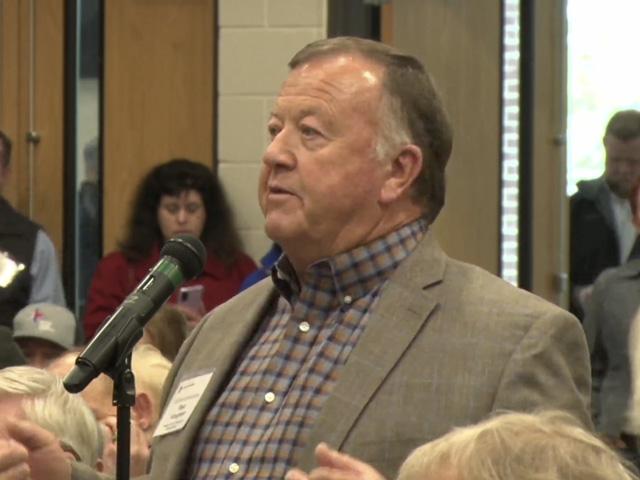Ag Policy Blog
Lawmakers Hear Texas-Size Challenges for Next Farm Bill
OMAHA (DTN) -- Dee Vaughan, a commodity producer from Dumas, Texas, was among the first producers to talk about needs of Texas producers in the farm bill as Texans had their say before members of the House Agriculture Committee on Wednesday in traveling listening session.
Vaughan, representing Texas Corn Producers, praised the House Agriculture Committee for a budget letter last week that pointed to the need to improve Title I, the commodity programs, in the farm bill. The committee's letter stressed that the support for farmers in the commodity title has eroded over the past decade, causing Congress to repeatedly pass ad-hoc disaster aid to support producers.
"You clearly defined what was wrong with Title I, among other things, but Title I specifically," Vaughan said.
Vaughan cited that rising input costs have reduced the value of the commodity programs for farmers – the Agricultural Risk Coverage and Price Loss Coverage (ARC and PLC) programs. Vaughan also said lawmakers should look at the effect of inflation on the current program payment limits as well.
"The same thing that has happened to our payment limits for an individual farmer has happened to the ARC and PLC reference price," Vaughan said. "Inflation has eaten it up."
In another commodity challenge, Vaughan also called on Congress to allow farmers to update their base acres as part of the farm bill.
"A lot of our producers don't have base acres," Vaughan said. "Or they don't have a crop base acre for what they are growing today. Maybe they grew it 20 years ago."
The House Agriculture Committee held the listening session in Waco, Texas, following one last month in Tulare, Calif.
POULTRY PRESSURES
Jerry Moody, a poultry grower from Texas, was the first to speak to lawmakers on Wednesday. He asked lawmakers to consider an insurance program for poultry growers to protect revenue from flock losses.
"We have no commodity groups. We have to represent ourselves. And I also believe there is a misconception that poultry growers don't have any risk. We have a lot of risk," Moody said. He added, "There are a number of things that are out of our control, and we can't protect ourselves."
Moody's comments come as highly pathogenic avian influenza (HPAI) has led to 58.6 million poultry that have been infected and depopulated over the past year. The Food and Environment Reporting Network cited this week that USDA has spent $670 million trying to cope with the current outbreak.
Moody also called on lawmakers to support a pair of rules now working through USDA that would expand transparency rules with large poultry integrators and discourage retaliation against contract poultry growers. Moody said Congress should defend smaller producers.
"I feel like I am a little fish in a very big pond in the chicken industry. But if we keep taking the little fish out of the big pond, there's no pond anymore.
P[L1] D[0x0] M[300x250] OOP[F] ADUNIT[] T[]
SNAP DEFENSE
Celia Cole, CEO of Feeding Texas, which operates food banks in Texas, told lawmakers about what makes the Supplemental Nutrition Assistance Program (SNAP) work. "SNAP is the biggest and most efficient tool we have for fighting hunger," and does the heavy lifting in hunger relief. Cole noted that cutting benefits increases strain on food banks and others. The end of the pandemic boost in SNAP aid is now putting more pressure on those resources, she said.
"Work requirements in SNAP are not an effective tool to improving employment outcomes," she said, pointing to some people facing significant barriers to employment. Pointing to problems facing SNAP recipients in Texas looking for jobs, "In short, our approach to work requirements. creates more red tape for SNAP recipients and not good jobs."
Cole's comments come just a day after Rep. Dusty Johnson, R-S.D., introduced a bill to tighten work restrictions for people defined as able-bodied adults on SNAP. Johnson's bill would make it harder for states to grant work waivers for able-bodied adults who do not have dependents.
Jeremy Everett, executive director for the Baylor University Collaborative on Hunger and Poverty, also told lawmakers about the collaborative's research nationally, such as research with USDA on rural children and hunger. They helped ensure more than 270,000 children would receive two meals a day during the pandemic school shutdowns. The program was extended by Congress. He also called for more research and pilot projects for "a growing number of older Americans facing food insecurity."
TEXAS SPECIALTY CROP NEEDS
Bret Erickson, representing Texas produce groups and the company Little Bear Produce, a producer of more than 40 produce mainly in the Rio Grande Valley. He said, "In Texas, we are being flooded with people yet barely an ag worker in sight. The ag labor shortage is a national food security crisis." Meanwhile produce imports continue to grow, he said. "We are now more dependent on foreign fresh produce than we have ever in the history of this country."
Erickson said U.S. produce growers are now at a competitive disadvantage, largely caused by government agencies and the unwillingness of Congress to pass agricultural labor reforms. He called on Congress to invest in research and development to help mechanize specialty crops.
"If you won't give us the people, give us the tools and technology to become more competitive domestically and globally," Erickson said.
Erickson also called on more funding for water infrastructure to rebuild "decrepit and broken" water delivery systems in areas such as south Texas.
On crop insurance, Erickson also said only a couple of specialty crops in Texas have crop insurance programs.
Dale Murden, a lifelong citrus grower and president of Texas Citrus Mutual, also talked about specialty crops, noting it is one of the most diverse areas of agriculture with the variety of crops grown. He talked about farm bill recommendations from the Specialty Crop Farm Bill Alliance. Murden also advocated the need for more mechanism in specialty crops. Murden also said current rules on adjusted gross income (AGI) often limit specialty growers from enrolling in USDA programs. A permanent disaster program also would be helpful, he said.
"Just in my end of the world in south Texas we've had some really bad luck in recent years," he said, pointing to a stretch of hurricanes, early freezes and drought.
While the Emergency Relief Program (ERP) and its predecessor WHIP-Plus, have helped, Murden said a lot of producers still have not received payments from 2020 and 2021 crop years, "and have no crop insurance program for their crops so a permanent disaster program is really needed."
RESEARCH NEEDS
Cliff Lamb, director of the Texas A&M AgriLife Research, also talked about research and resiliency, as well as economic stability of both livestock and crops operations. Lamb also said every dollar spent on research translates into $32 in economic returns.
"For us, we have an aging infrastructure. We need significant infrastructure investments into our agricultural research institutions, and we need to continue to shore up our agricultural research opportunities at USDA in many ways on the competitive side," Lamb said.
Lamb talked abut the need to address biological defense in the food system and in the food supply chain as well. That's especially true in Texas, which imports a high volume of agricultural products across the border and ports, he said. Technology such as artificial intelligence can help detect problems with those imports, he said.
On Wednesday the Association of Public and Land-grant Universities (APLU) detailed its farm-bill priorities for research as well. The group research funding over the past decade in agriculture has risen by only 2% while costs have gone up 18%. The group is calling on Congress to dramatically increase research funding in the farm bill, an effort echoed by others such as the National Association of State Directors of Agriculture (NASDA).
On Thursday, the farm bill push will continue with the Senate Agriculture Committee holding a hearing with Agriculture Secretary Tom Vilsack testifying before senators.
Video for the full listening session can be found at https://www.youtube.com/…
Chris Clayton can be reached at Chris.Clayton@dtn.com
Follow him on Twitter @ChrisClaytonDTN
(c) Copyright 2023 DTN, LLC. All rights reserved.






Comments
To comment, please Log In or Join our Community .